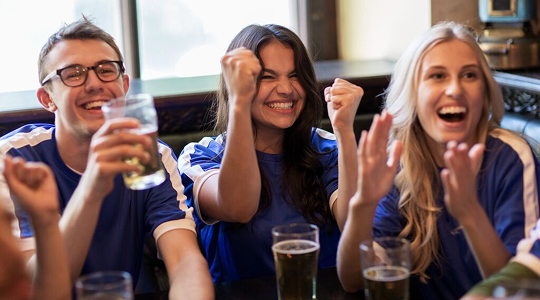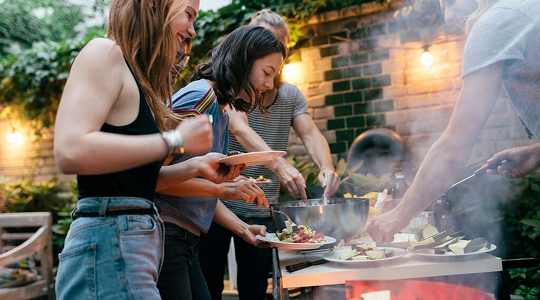What’s fuelling the UK’s sober curious movement?

Your health expert: Dr Naveen Puri, Medical Director for Bupa UK Insurance
Publish date 07/04/2025.
Next review 07/04/2026.
Dr Naveen Puri, Medical Director, Bupa UK Insurance, looks at the growing sober curious trend sweeping the UK and shares advice for those considering cutting back on alcohol.
Our research on alcohol consumption
We’ve researched what the UK knows about the effects of alcohol and seen huge changes in our Google search habits over the last four years.
In particular, more seem to be interested in the sober curious movement.
The term ‘sober curious meaning’ has increased 24-fold.
Currently, 63 per cent of UK adults drink at least once a month.
We also know that 90% of drinkers are trying to moderate their drinking in some way. But what's fuelling the movement?
What do the search engines say?
Google search volume data from February 2025 shows that more people are turning to the internet to look for answers about the effects of drinking alcohol. The data shows:
Hangxiety
Searches have increased 8-fold.
Can drinking cause hair loss?
Searches have quadrupled.
Can alcohol make you break out?
Searches have doubled.
Can’t sleep after alcohol
Searches have doubled.
Stomach hurts from drinking alcohol
Searches have doubled.
Hangxiety
Many people wake up feeling anxious after a night of drinking. These psychological symptoms can happen alongside physical hangover symptoms, like feeling sick or having a bad headache.
If you’ve been feeling more anxious than usual in recent years, alcohol may make you feel worse.
- Our anxiety research suggests you might feel overwhelmed, guilty or agitated.
- In some people, this can lead to panic attacks, even if they’ve never had one before. Or don’t usually consider themselves an anxious person.
What causes hangxiety?
Several factors can make you prone to anxiety after drinking.
Alcohol is a depressant
This means it affects your central nervous system.
Whilst drinking might make you feel lighter and happier at first, your brain is left to deal with the chemical changes that may leave you in a negative mood.
These feelings of anger, anxiety or depression can occur even if you’ve been in a good mood otherwise.
Anxiety
If you’re an anxious person, you might find the idea of drinking alcohol appealing to help relax your mind.
The relaxing effects are short-lived and alcohol can leave you feeling more anxious in the long run.
Those who drink alcohol are also more likely to develop mental health problems.
How to stop anxiety after drinking alcohol
The best way to avoid hangxiety is to not drink at all, but if you do drink, be mindful of the amount you consume.
Research shows that UK adults are most likely to drink when they’re at home.
This might make it easier to overindulge. Did you know that three large glasses of wine for men, or two large glasses of wine for women in one session is considered binge drinking?
In a week, you shouldn’t exceed 14 alcohol units in total, and you should space out your consumption. Make sure you have alcohol-free days.

If you’re already hungover, tackling your physical symptoms first may set you up to combat the mental symptoms better, later.
- Beware of hangover myths (PDF, 2.5MB), like ‘hair of the dog’ or doing a workout. They can make you feel worse in the long run. Instead, rest up, drink plenty of water and take over-the-counter painkillers responsibly, if needed.
- It may also be worth exploring the possible reasons why you’re drinking in the first place. Especially if hangxiety is becoming more of a regular thing for you. Are you using alcohol to unwind or to help you sleep?
- If so, are there any other, more productive ways to reduce your intake and help you feel relaxed? If you’re struggling with your mental health or sleep and find alcohol is your go-to relaxant, consider speaking to a health professional.
- Talk through what you’re feeling, to see if there’s any help available to help unpick any unhealthy habits and find more sustainable ways to cope.
Appearance effects of alcohol
Our research found that the UK is increasingly worried that their drinking habits may be impacting their appearance.
Can alcohol cause hair loss?
Alcohol dries your hair out, as well as your skin.
When you have dehydrated hair, it’s easier for it to become damaged, broken and split. Whilst alcohol doesn’t cause male or female pattern hair loss in the traditional sense, it can cause the quality of your hair to deteriorate.
In extreme cases, that could cause hair loss due to hair damage.
Can alcohol make you break out?
Alcohol is linked to several skin conditions, including acne and rosacea.
Studies show that alcohol can cause hormonal imbalances in your skin. These imbalances lead to more skin oil (sebum) production, that can block your skin’s glands and lead to a build-up of bacteria and dead skin cells in your pores.
If you have acne, this might cause a flare-up or worsen any existing acne.
Skin conditions like rosacea can also be triggered by drinking alcohol
Research has shown that white wine and spirits put women at higher risk of developing rosacea.
The lack of sleep, sugar content and poor diet choices linked with drinking may lead to stress and cause skin flare-ups. Even if you don't have conditions like acne or rosacea.
Can’t sleep after alcohol
Drinking has a direct effect on your sleep quality.
It can cause poorer quality sleep and less time in the rapid eye movement (REM) stage.
As little as a couple of drinks can disrupt your regular sleep cycle. Alcohol is classed as a diuretic, meaning that it causes you to pass more urine.
You might find yourself having to get up partway through the night to go to the toilet, disrupting your sleep further.
Alongside additional trips to the toilet, alcohol might make you snore.
Increased snoring is caused by the muscles in your nose, mouth and throat relaxing as they're more likely to vibrate as you breathe. If you struggle to sleep, reducing the amount you drink causes the quickest improvement to sleep.
Physical effects of alcohol
A session of heavy drinking, or drinking regularly over a long time can lead to stomach issues.
Drinking causes irritation to your stomach and intestines. Some evidence shows it leads to increased acid production.
In some cases, it leads to a condition where the lining of your stomach becomes inflamed. This is called gastritis.
Gastritis can lead to stomach pain. You might feel a burning or churning sensation. It can make finishing a meal feel uncomfortable, cause indigestion, nausea or vomiting.
Longer term gastritis can usually be avoided by making lifestyle changes, like eating better, moving more and drinking less alcohol.
If you suffer from stomach pain after drinking, it could be a signal that you’ve drank too much.
Make sure you’re drinking no more than 14 units per week in total. Don’t have more than six units in one sitting, along with ensuring you have alcohol-free days.
Speak to a health professional if you’re experiencing stomach pain after cutting back on drink.
It could be a sign of another health condition.
What are the health benefits of giving up alcohol?
Reducing your intake or giving up alcohol completely can provide health benefits you can see and feel.
- 1. Sleep: the first thing you’ll feel improve is your sleep quality. More time in rapid eye movement (REM) sleep helps you to feel more alert the next day, too.
- 2. Possible weight loss: alcohol contains lots of calories. Cutting back on your intake and the temptation for late night snacks can reduce your calorie consumption.
- 3. Reduced risk of stroke
- 4. Reduced blood pressure and blood sugar
- 5. Reduced risk of several types of cancer
- 6. Liver damage and disease risk reduces
- 7. Improves the impact of some existing health conditions, like rosacea and depression
I don’t drink. How do I tell others?
Three out of five 18–34-year-olds think there’s a widespread pressure to drink.
If you feel like you’re challenging the status quo with your drinking choices, the biggest thing to remember is that choice is yours and nobody else’s. It might feel intimidating to gauge how others will react when you share you’d prefer to drink no alcohol.
Rehearse what you want to say. Good starters can include things like:
I’ve decided that I don’t want to drink anymore, because...
I’ve been drinking less for my health and feel so much better for it…
I prefer not to drink now. I’ve found that I can still have fun without it, and I love waking up the next morning feeling energised.
I’m on a health kick at the moment so I’m avoiding alcohol. Would you like to go to the cinema/for a walk/exercise class with me, instead?
I’ve been worried that I’m drinking a bit too much so I’m cutting it out to see how it makes me feel.
What would you say to trying an alcohol-free party?”

Be consistent in what you want to say, and try to ignore any judging remarks from friends or family members.
Remind yourself of the reasons you don’t drink, or want to cut down. It might help ease your mind to let people know in advance. For example, if you’re going to an event together. You could even let a few trusted friends know first, who can help to back you when challenged.
You might find it comforting to know that you’re not the only person challenging their own drinking habits. In the last four years, Google searches for ‘non-alcoholic parties’ have increased fivefold.
What not to say to someone who doesn’t drink
If you have a friend, family member or colleague that’s made the decision to stop drinking, it might come as a shock. Especially if your friendship has been built on times where you drink together. However, it’s key to put those feelings aside so you can support them and their health decisions.
Remember that it may have taken someone a long time to decide they no longer want to drink. What you say and how you act around them can be a huge help to them and may encourage you to assess your own drinking habits, too.
Don’t ignore them and buy them an alcoholic drink anyway
Don’t say “come on, it’s only one”
Don’t imply that they’re being boring or odd”
Don’t tell them that they don’t have a drinking problem
Don’t ask them why they’re not drinking unless they share why


